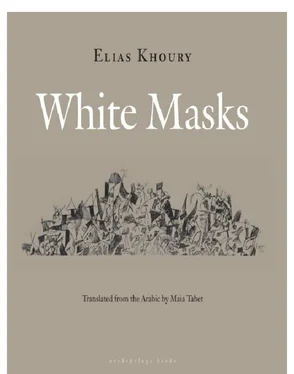Elias Khoury
As Though She Were Sleeping
And when, in the course of his journey through the wilderness,
Jesus came upon a decaying skull and beseeched God that it should
speak, the Lord gave it to utter thus: “I am Balwan bin Hafs, king
of Yemen. I lived one thousand years, sired one thousand offspring,
deflowered one thousand virgins, defeated one thousand armies,
and conquered one thousand cities! But all of this was like a dream,
and may he who hears my tale not be deceived by the world.”
And Jesus, peace be upon him, did so passionately weep that he
fainted.
AL-ABSHEEHI, Al-Mustatref
This is no tale. And it may not be of particular interest to readers, as people these days have more important things to do than read stories or listen to tales. And they’re absolutely right. But this story really did happen.
The truth is that it didn’t happen just like that. One morning, I saw in the paper a short piece entitled “Dreadful murder in the UNESCO district” and, don’t ask me why, but whenever I see the word “dreadful,” the word “wonderful” springs to mind. So the phrase stuck in my mind like this: “Wonderful murder in UNESCO.” My eyes skipped from this “wonderful” crime to a photograph of the victim: a man in his fifties, with traces of bruising on his chest and puncture wounds to his face. I didn’t linger over the picture — the terrifying visions that fill my nights are enough for me, I don’t need new nightmares. Although I tried, I couldn’t place the man’s name, but I seemed to remember that I had come across him somewhere. Turning finally to the note printed alongside the photograph, which was very brief, I read the following: “The corpse of an unidentified man has been found in the UNESCO district of Beirut, near the Habib Abi Shahla statue, bearing gunshot wounds, abrasions, and bruises. According to the forensic pathologist’s report, death occurred three days earlier.”
Before I knew it, I was following the story of this corpse, step by step. I have admired Habib Abi Shahla, one of the architects of Lebanon’s independence, ever since I was a boy — besides which, of all the monuments commemorating the leaders of the independence movement, his was the only one that had not been felled in the civil war. The statues of both Riad al-Solh and Beshara al-Khoury were destroyed, leaving Habib Abi Shahla the sole remaining witness to our independence. What’s more, in addition to being a rather extraordinary figure, it is rumored that Habib Abi Shahla also died an uncommon death, expiring in the arms of a woman as they made love.
As a boy, I was absolutely enthralled by this — what a way to go, I thought! And though I later learned that it happens to a lot of men, this did not diminish Habib Abi Shahla’s standing in my eyes: to me, he remained a trailblazer, and certainly the most illustrious of men to have met with such an end. When our neighbor, Saïd al-Sabbagh, passed away, a rumor went around the neighborhood that he died making love to his wife. Now that is a beautiful death, I said. When I asked my father about it he gave me a scathing look, but I knew that he knew the details — our late neighbor’s wife was one of his many mistresses. He denied it, and did so vociferously, but I caught him — no, of course I never told him, I would be too embarrassed — with the laughing young widow in his arms, as they stood waiting for the elevator one day.
So I followed the story of the corpse out of plain curiosity but also because it provided me with this link to Habib Abi Shahla. I had graduated in political science from Lebanese University in 1974, just a year before the start of the civil war and, owing to “prevailing circumstances,” had been unable to find a job to match my ambitions — as a journalist, for instance. So I worked in a travel agency, where all I did was sit for hours on end at a computer that looked like a calculating machine, issuing tickets and waiting. I thought the story of the corpse would help me pass the time, especially after it turned out that the victim, Mr. Khalil Ahmad Jaber, lived in our neighborhood in Mazra’a. He was a Lebanese citizen, born in 1928, employed at the Lebanese post office — the Post, Telegraph, and Telephone department, or PTT, as it is known.
The murkier the story got, the greater my interest grew. Thanks to a variety of sources I was able to contact, as well as my daily perusal of the papers, I was able to collect a vast amount of information pertaining to the murder, which, according to medical reports, took place on the morning of April 13, 1980.
So I’m setting out to tell this story, which is really not a story, as the discriminating reader might observe, and which I know might well be of absolutely no interest to anyone. The reader could just refer to the forensic pathologist’s report and dispense with all the attendant detail; alternatively, he might find it sufficient to read the wife’s statements or those of the municipal workers — they were the ones to discover the naked corpse dumped on the roadside. Indeed, the reader might even regard this introduction as adequate, and leave it at that. Every one of us has a story, after all, and that’s more than enough. We have no need of other people’s.
The information I’ve been able to collect about the deceased is highly contradictory. Some say he had amassed a considerable fortune during the war, thanks to his “martyred” son, Ahmad. Before his “martyrdom,” Ahmad had been a boxer and a contender for Lebanon’s featherweight title, but then he joined one of the militias — whence the alleged fortune, which he would have kept at his parents’ house. After he died in one of the Qomatiyyeh skirmishes, his comrades-in-arms went to his father demanding the treasure. Khalil Ahmad Jaber told them he knew nothing about it. He said he had no knowledge whatsoever of a stash of money that they claimed was in his son’s possession. This, therefore, could be the motive for his murder. However, the evidence strongly suggests otherwise, as Mr. Khalil Ahmad Jaber’s house was not searched or ransacked, either before or after his murder, and neither Mr. Khalil Ahmad Jaber, nor any of his family members, exhibited any sign of conspicuous wealth after the son’s demise.
Another avenue of thinking regarding the motive for the murder would link him to some woman. However, Khalil had no history of drinking or womanizing, and all who knew him could attest to that. He was, on the contrary, a real homebody, his only pastimes being an occasional game of checkers or backgammon, and watching TV. Such a hypothesis, therefore, appears completely improbable.
A final hypothesis remains, that Mr. Khalil Ahmad Jaber was the victim of a case of mistaken identity, a common occurrence these days. But likelihood of such an error is remote given that the victim had his ID card on him: while it was retrieved far from the body, it appears that it was thrown there by the criminals in their attempt to muddy the evidence and obstruct the inquiry. So that this was simply a sectarian killing seems very unlikely, or indeed impossible, as Mr. Khalil was known to all the militiamen of his neighborhood and would have been able to prove at any checkpoint that he was the father of Ahmad, the “martyr” — and checkpoint personnel are obligated to treat a martyr’s father with the respect that is his due.
Who then killed Khalil Ahmad Jaber, and why?
The truth is that after collecting this vast amount of information, I find myself quite baffled — there seems to be neither rhyme nor reason to this dreadful, wonderful murder, and no motive for it.
Mr. Khalil Ahmad Jaber’s disappearance three weeks prior to the crime may, however, hold the key to the mystery. On Thursday, March 20, 1980, the deceased left for work and did not return. People attributed his disappearance to kidnapping — they thought he might have been on his way to visit his daughter, Su’ad, who is married and living in Tripoli, when he was kidnapped on the Jounieh-Tripoli highway. This supposition remained firm in everyone’s mind until the body was found at the UNESCO roundabout. Should one then conclude that Khalil Ahmad Jaber was indeed kidnapped on his way to Tripoli and that his corpse was only later dumped beside the Habib Abi Shahla statue, as the forensic pathologist’s report surmises?
Читать дальше












